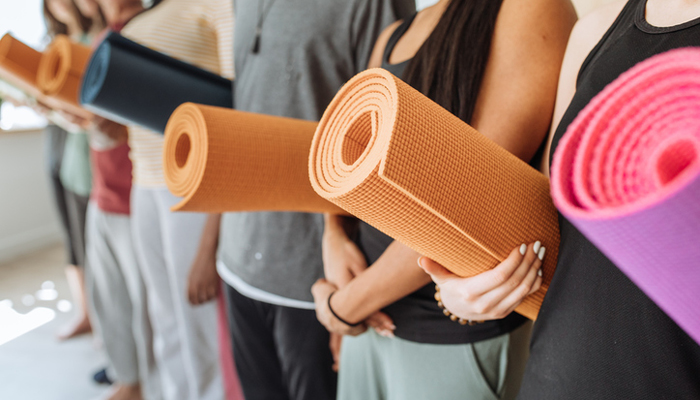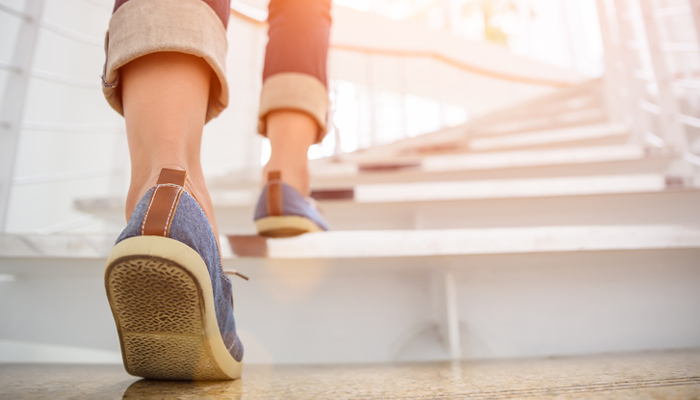
Rate this article and enter to win
Chances are, if you’ve ever set foot in a gym, it was to build muscle or get fit—and there’s nothing wrong with that. But working out can have way more of an impact on your body than just physically.
“Exercise can help improve mood, reduce stress and anxiety, and can help you sleep better,” says Alissa Rumsey, a strength and conditioning specialist in New York. That brainpower boost can set you up for academic success all year long.
Here are 3 ways exercise can upgrade your life (that aren’t just physical):
“Exercise increases your heart rate, which helps supply your brain cells with plenty of oxygen for brain power and growth,” says Rumsey. With that boost, getting regular exercise can improve your memory, focus, and ability to process information. Translation: It can help you potentially get better grades in school.
Memory
Scientists at the University of Illinois have found that moderate exercise, like brisk walking, swimming, etc.—three days a week improves memory by literally growing your brain volume. The hippocampus, the part of the brain primarily associated with memory, naturally shrinks as we age. But the researchers found that regular exercise boosts the volume of the hippocampus, thereby improving memory. Additionally, those who were physically active on a regular basis had better motor skills (i.e., all the actions that involve muscle movement) compared with people with a sedentary lifestyle, according to a study published in the Journal of Health Psychology.
Focus
A study published in the Journal of Adolescent Health found that students who started running just 30 minutes a week reported improved concentration in class (in addition to better mood and better-quality sleep—triple whammy). “When I work out, I feel more relaxed, have a clear mind, and feel ready to sit down and do homework or go to bed,” says Gina B., a fourth-year student at the University of Wisconsin-Eau Claire.
Information processing
Regular cycling and stretching exercises can improve your test skills, according to a study published in the Journal of Health Psychology.

Exercise stimulates the release of a chemical in the body called brain-derived neurotrophic factor (BDNF), which is associated with decreases in anxiety and depression, according to a 2016 study. BDNF supports neuron growth and survival, the capacity to learn, and memory function. It has also been shown to positively affect our body’s ability to keep blood sugar levels consistent, which is important for maintaining energy, concentration, and overall health, as well as stabilizing our emotions and stress levels.
A 2017 study published in the American Journal of Pharmaceutical Education found that being active can help even the most stressed out students. Researchers surveyed pharmacy students (a population that tends to be under high stress and pressure) and found that those who used exercise as a coping mechanism reported significantly lower stress levels.
It seems logical that exercising would sap your energy—but several studies show the opposite to be true. One study from the University of Georgia’s Exercise Psychology Laboratory found that regular exercise increased the energy of sedentary participants by 65 percent. According to its findings, low-intensity exercise—think walking or yoga—is actually a better energy booster than working out harder (though both low- and moderate-intensity exercise increased participants’ energy).
“I have higher energy levels [when I work out],” says Aleksi M.*, a recent graduate of the University of Illinois. “Furthermore, working out consistently helps me feel tired at night and thus leads to an early night’s sleep.”
How does it work? Another study published in the Journal of Applied Physiology found that physical exercise stimulates the development of mitochondria—the part of each cell where energy production happens—in brain cells. That stimulation ups your body’s energy and can help boost your productivity.
How to make time for fitness

Here’s the thing: Any movement is good for your brain. “A lot of studies [on the benefits of exercise] look at walking, so it doesn’t have to be anything really intense,” says Rumsey. In other words, you don’t need to sign up for a weight-lifting competition to feel the effects.
Grab your friends for a basketball game, take a walk around the neighborhood, or go salsa dancing. “All kinds of movement are good, even playing with your dog or younger siblings,” says Elliece R., a fourth-year undergraduate at the University of Regina in Saskatchewan, Canada.
Park farther from buildings, walk instead of taking buses or shuttles, and use the stairs. These seemingly small activities add up.
Try these moves for a quick workout you can do in your room.
“There’s no need to do exercise that you hate,” says Rumsey. “Try different classes like boxing, swimming, yoga, Pilates, and biking.”
Rather than catch up over coffee, go for a walk with a friend.
Get involved on campus in a way that’s social but also boosts your activity levels. Check out on-campus exercise classes or intramural teams for a sport you’ve never tried.
Exercise and stress: The Mayo Clinic
Physical activity videos: Centers for Disease Control and Prevention
Top exercise tips for busy college students: American College for Medical Careers
Alissa Rumsey, MS, RD, CSCS, founder of Alissa Rumsey Nutrition and Wellness, New York.
Erickson, K. I., Voss, M., Prakash, R., Basak, C., et al. (2011). Exercise training increases size of hippocampus and improves memory. Proceedings of the National Academy of Sciences of the United States of America, 108(7), 3017–3022. doi:10.1073/pnas.1015950108
Garber, M. (2017). Exercise as a stress coping mechanism in a pharmacy student population. American Journal of Pharmaceutical Education, 81(3).
Hötting, K., Reich, B., Holzschneider, K., Kauschke, K., et al. (2012). Differential cognitive effects of cycling versus stretching/coordination training in middle-aged adults. Health Psychology, 31(2), 145–155.
Kalak, N., Gerber, M., Kirov, R., Mikoteit, T., et al. (2012). Daily morning running for three weeks improved sleep and psychological functioning in healthy adolescents compared with controls. Journal of Adolescent Health, 51(6), 615–622. doi:10.1016/j.jadohealth.2012.02.020
Nofuji, Y., Suwa, M., Sasaki, H., Ichimiya, A., et al. (2012). Different circulating brain-derived neurotrophic factor responses to acute exercise between physically active and sedentary subjects. Journal of Sports Science and Medicine, 11(1), 83–88.
Puetz, T., Flowers, S., & O’Conner, P. (2008). A randomized controlled trial of the effect of aerobic exercise training on feelings of energy and fatigue in sedentary young adults with persistent fatigue. Psychotherapy and Psychosomatics, 77(3), 167–174. doi:10.1159/000116610
Sleiman, S. F., Henry, J., Al-Haddad, R., & El Hayek, et al. (2016). Exercise promotes the expression of brain derived neurotrophic factor (BDNF) through the action of the ketone body β-hydroxybutyrate. Elife, 5.
Steiner, J., Murphy, E. A., McClellan, J., Carmichael, M., et al. (2011). Exercise training increases mitochondrial biogenesis in the brain. Journal of Applied Physiology, 1066–1071. doi:10.1152/japplphysiol.00343.2011




































